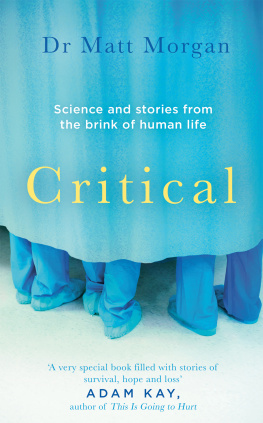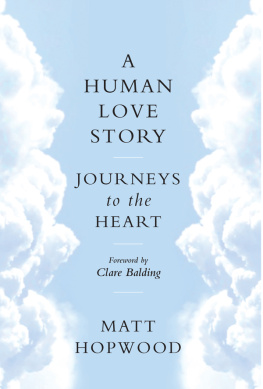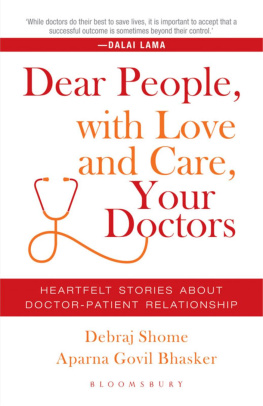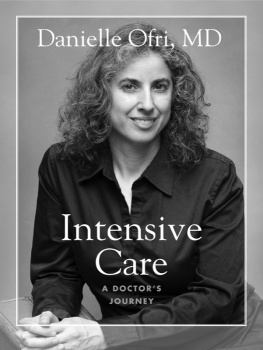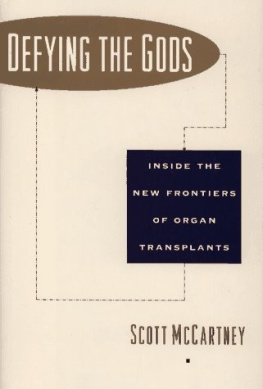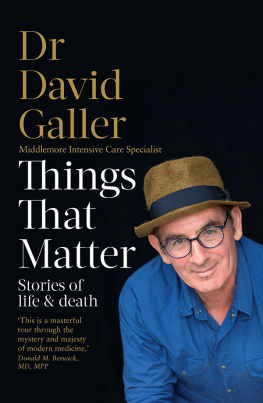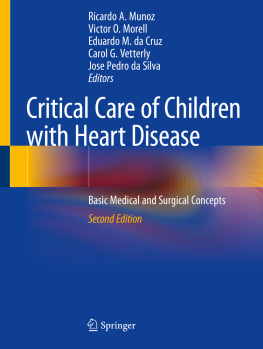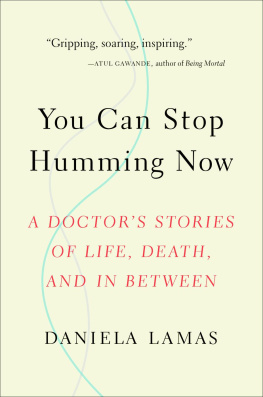A very special book filled with stories of survival, hope and loss.
Adam Kay, author of This is Going to Hurt: Secret Diaries of a Junior Doctor
Matt Morgan is an engaging, honest and perceptive doctor who has managed to pack an awful lot into his career. This book promises to offer a real insight into an area of life-and-death medicine that many of us will have seen dramatised on television.
Michael Mosley, author of The Fast Diet , The 8-Week Blood Sugar Diet and The Clever Guts Diet
I loved it. So carefully written and obviously as a doctor, I could totally get behind the stories of Gram and the origins of the ICU, but the patients stories... just so touching. I love the exploration of what it means to survive and at what cost.
Dr Nikki Stamp FRACS, Cardiothoracic and Transplant Surgeon and author of Can You Die of a Broken Heart? A Heart Surgeons Insight Into What Makes Us Tick
A gripping realism of life in intensive care that reminds us how fragile is life. Written with humility and insight this is an intriguing glimpse into a world of life-saving decisions. It is life affirming and hugely reassuring.
Professor Dame Sue Black, author of All That Remains: A Life in Death
Matt Morgan writes beautifully and movingly about the edges of life. Through vivid encounters and pitch-perfect insights, he shines a light on the human experience at the frontiers of healthcare.
Ganesh Suntharalingam, President, Intensive Care Society
This book is marvellous: buy it, share it, recommend it... We are fortunate to have dedicated, caring and humble folks such as Doc Morgan on the critical care front line. We are even better off when a writer can capture all that this exciting, mad, glorious and even exasperating job means. If you work in healthcare, know somebody that does, or simply inhabit a body then this book is for you: in fact its critical.
Professor Peter Brindley, Professor of Critical Care Medicine, Anesthesiology, Medical Ethics, University of Alberta
I am an intensive care doctor and reading Critical should have been wholly uninspiring. It was, in fact, quite the reverse. Matt uses language as a great surgeon would a scalpel with precision, but also grace. I cant commend this book highly enough. My sole regret is that I didnt write it myself.
Professor Hugh Montgomery
For my mum and dad,
who taught me that anything is possible
A UTHORS N OTE
I have changed some of the personal details of patients in order to help protect their privacy. Where cases are likely to disclose a patients identity through their unusual nature, I have sought patient consent or assent from their relatives to share these details with the reader. While all clinical cases are based on real patients I have met, I have combined some of their stories and improved the narrative for the reader. I have only included facts that I believe to be true, although I have not sought independent verification of second-hand details given to me by colleagues, families or friends. Some of the themes discussed in this book have been adapted and expanded upon from my blogs published by The BMJ (British Medical Journal).
P REFACE
In 2016, I attended a medical conference in Dublin, Ireland. The speakers were brilliant, the venue impressive and the whole experience inspiring. On the final day, I left with a real sense of hope and motivation, eager to face my day job as an intensive care consultant, fizzing with new ideas. That evening, serendipity took me by the hand to an old Irish bar and changed my life. A local asked me what I was doing in the city. I explained that I had been at a medical conference.
Oh great, she said. What kind of doctor are you?
Im an intensivist, I replied.
What on earth is that? she asked.
At that moment, something profound struck me. I had spent the last decade writing academic research papers that few people would ever read. I had travelled the world, speaking at medical conferences to audiences who understood the topics that I spoke about better than I. Despite all of this hard work and effort, Id forgotten about the most important person: you.
You are my past patient, my future patient, the son, daughter, father, mother or neighbour of my current patient.
That cold Irish evening, through the dark mist of my final Guinness, I started writing this book. It is not a book filled with joy indeed, there will be sadness but there is always hope. I will take you on a journey to the light and the dark places that critically ill patients visit. Even in death, glimmers of the future can reflect in the smallest of spaces. I will borrow the bodies, the lives and the families of real patients I have met, and I will use them to shed light into these deep cracks where life meets death.
If I work hard today, tomorrow and the day after that, I may save one life. In my whole career, I may save hundreds. However, I hope this book will achieve far more. I hope that it will show you what intensive care can, should and perhaps should not do. It will offer you powerful insights that may prevent those close to you from ever needing to meet me. It will even teach you how to save a life. It will raise your awareness of the most significant harms in society and allow you to glimpse at the very edges of life. The fragility of life will become clear, yet this will be shown to be offset by the incredible resilience and tenacity of humanity.
I will now take you on a journey through the world of intensive care, offering you a glimpse of the patients we treat every day, with each chapter inspired by the people I have met at the front line of clinical medicine. We will explore the inner workings of the physical ICU (intensive care unit) as well as my mind as a doctor working within it. You will experience the sounds, smells and sights of the most dramatic area of the hospital. We will travel through the main organ systems of the human body, find out how we can keep people alive without a pulse, and what happens when a patient becomes brainstem dead. I will share with you the highs and the lows that patients, families and healthcare staff witness through the course of fighting human fragility. While the lows can be dark, I am privileged to support patients and their families while they stand at the brink of existence. Through this lens, I am reminded daily of the beauty of life. The late Steve Jobs said in a Stanford commencement address that death was lifes greatest invention, allowing us to appreciate the time we have on this earth to share with others. Sometimes darkness can show you the light.
Dr Matt Morgan
@dr_mattmorgan
January 2019
1
A N I NTRODUCTION TO THE W ORLD OF I NTENSIVE C ARE M EDICINE
How a little girl helped to save the world
Intensive care doctor:
intensivist, critical care doctor,
intensive care medicine doctor,
resuscitationist, but, ultimately,
just a human.
It was a beautiful sunny August evening in Copenhagen as Vivi danced in her garden after returning home from school. She was a happy twelve-year-old girl, with sandy-golden hair and apple-red cheeks. Life was tough since her parents had separated; her mum struggled to make ends meet working as a hatmaker. She watched her daughter through the window, dancing barefoot on the grass as she giggled and smiled to herself. Forty-eight hours later, Vivi was about to die. This is the story of the people, practices and technology which allowed her instead to live. Her journey was the first step along a sixty-five-year-long journey that now enables us to enjoy life in the face of devastating critical illness. This is the story of how intensive care can save your life.
Next page
